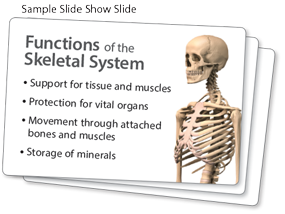Presenting in Person
Making oral presentations is a common activity in school and in the workplace, although some people feel more comfortable than others with speaking in front of groups. If public speaking makes you nervous, you can reduce your anxiety by being fully prepared. Here are some ways to prepare for an oral presentation.
Note Cards
Many presenters use note cards to keep themselves on track. Note cards are an unobtrusive way to record what you want to say. Write out a complete introduction and closing on the first and last cards, and list your main points on the middle cards. Remember to number each card and arrange them in order. (See page 78.)
Outlines
An outline is another common presentation format. Use it to organize your key points, and refer to it as necessary during your presentation. (See page 374.)
Slide Shows

Slide shows, such as PowerPoint presentations, can guide your delivery by correctly ordering the information you want to share. Use bulleted lists for main points; but unlike with note cards, do not include a word-for-word introduction and closing. As part of your oral presentation, prepare slides that augment but do not distract from your own words, and avoid reading slides word-for-word. (See pages 77-79.)
Manuscripts
A manuscript provides a full transcript of your presentation, written out word for word. While a manuscript gives you the confidence of knowing exactly what to say, it may also keep you from making eye contact with your audience. Practice enough to be able to look up from the paper frequently. Follow these tips:
- Use large type (14 point or more) so that you can read without leaning forward or squinting.
- Set main ideas in bold so that you can easily pick them out.
- Use bolded brackets to set off directions for slides or props.
- See pages 77–79 for more help with oral presentations.
Your Turn Create note cards, an outline, a slide show, or a manuscript for an oral presentation of an upcoming project.
